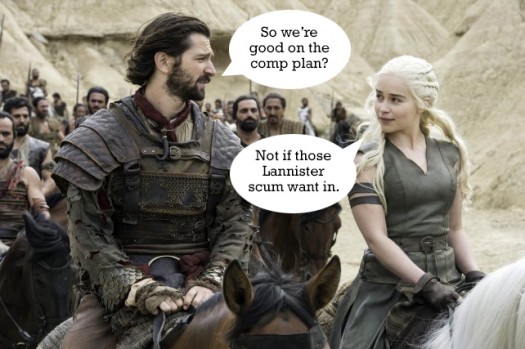A Placemaking Journal
Comp Plan for Westeros? Same issues, more swordplay
Frustrated with efforts to pull your little kingdom together for long term strategizing? It could be worse. You could be caught up in the public outreach drama in Westeros. The battles renew on Sunday night, when HBO debuts season seven of “Game of Thrones.”
The addictive series provides way more sex, blood and dragons than your typical comp planning project in American communities — at least in my experience. Nevertheless, the narrative undergirding, built as it is on the ambitions and frustrations of alliance formation, is plenty familiar. Which might help us talk about why holding together coalitions to get ambitious stuff done in our own communities is both essential and elusive.
Without diving too deeply into GOT’s complex rivalries, here’s what drives the action:
Factional leaders, each with what they consider legitimate claims on the Iron Throne, lack the political support and the resources to achieve their vision on their own. So they need others to buy into their campaigns. Which requires coalition building. Which, in turn, requires the glue of trust to hold everything together till success rewards cooperation.
Those who are connected by kin and clan, of course, have an easier time pledging cooperation, even if it’s with reluctance. The penalties for betraying blood relations are severe. But other clan leaders are not so inhibited. They can weigh risks and rewards situationally, bestowing and withholding trust depending on how the calculus of advantage evolves. And if they’re harboring old resentments — as is the case with most GOT rivals — the desire for revenge can overpower even strategic self-interest. All of which means trust, especially the kind that endures despite occasional setbacks, is hard to come by and even harder to sustain.
You get where I’m going with this?
Consider current urban planning squabbles in places like San Francisco, Seattle and Portland. And coming soon to other places where the demand for the high-quality amenities of urbanism outraces the supply.
What should unite the feuding clans in Westeros is the prospect of an invasion of — I kid you not — hordes of freeze-dried zombies on the march from the north country. In high-demand cities, the unifier should be a sense of urgency to address the cumulative effect of economic and land planning policies flunking the test of inclusive community. To keep “Game of Thrones” entertaining for its two remaining seasons, we can expect more violence and intrigue among rivals, at least until the zombies are at their doors. But do we really need to wait until things are more hopeless to bridge the trust gaps in our cities and regions?

I’ve been keeping an eye on the clash on the left coast between groups that should be on the same side of affordability and opportunity solutions. Growing YIMBY (Yes In My Backyard) factions are arguing that the affordable housing crisis needs changes in policies that over-restrict new construction and prevent densification. They’re open to working with both for-profit developers and affordable housing programs to increase housing options, especially rental options.
The YIMBYs, of course, are modeling a contrasting set of approaches to entrenched NIMBYs, who are suspicious of, if not openly hostile to, new development in existing neighborhoods. NIMBY arguments are often framed as anti-gentrification and community character preservation. In San Francisco — because: San Francisco — it’s the lefty YIMBYs against the far-lefter Bay Area Renters Federation (SF-BARF, for real) NIMBYs. In a recent piece for the California Planning & Development Report, Josh Stephens, urged toning down the rhetoric. Especially the lefter-than-thou rhetoric from SF-BARF, whose leaders, says Stephens, decided (the YIMBY types) “are ‘pro-gentrification,’ in league with greedy real estate developers.”
They equate support for market-rate housing with support for ‘luxury’ housing. They also equate it with not just tolerance for but, it seems, approval of displacement. YIMBYism, they claim, is ‘rooted in the same classist, racist ideologies it supposedly seeks to disrupt,’ in line with redlining, slum clearance, urban renewal, and other explicitly discriminatory practices of decades past.
Enough, already, says Stephens.
I get it. I get resentment. I get fear. I get the fraught history surrounding the urban poor. But I don’t get the vitriol, and I don’t respect the dishonesty.
I submit that honesty and compromise remain admirable values and effective political tools — especially on the local level where policymakers, community members, and activists are literally rubbing elbows with each other.
My best advice for YIMBYs and anyone else interested in building prosperous, inclusive cities is to embrace their causes – of social justice and affordable housing – more enthusiastically than ever. The equitable city depends on protections from displacement, social justice, and affordable (subsidized) housing just as much as it depends on market-rate development, place-making, and urban amenities. YIMBYs can wage those battles whether the far left likes it or not.
As for the planners quietly slaving over applications and zoning code rewrites: this debate is coming your way whether you like it or not. There’s never been a better time to get fired up about housing, equity, density, and all the other fundamental challenges that make good planning — and good mediation — so important. I can’t fathom who benefits from getting worked up over the 10 percent of disagreement rather than excited about the 90 percent of common ground.
Sound reasoning, no?
Were it taken by activists in Westeros, the advice would spoil eight seasons of spectacularly entertaining mayhem. But I’m thinking that right about now, those of us on the other side of the TV screen could use a little less drama in our lives.
–Ben Brown
If PlaceShakers is our soapbox, our Facebook page is where we step down, grab a drink and enjoy a little conversation. Looking for a heads-up on the latest community-building news and perspective from around the web? Click through and “Like” us and we’ll keep you in the loop.






